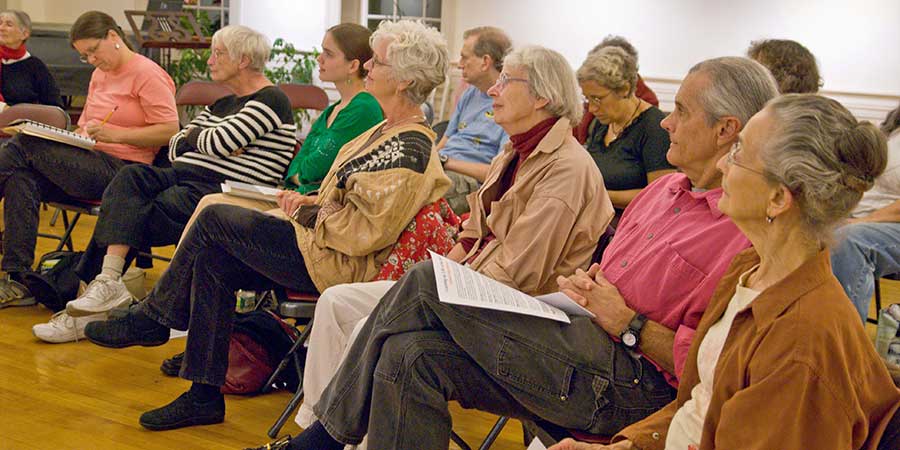Friends Meeting at Cambridge is a large Meeting with 300 active members and attenders. Moreover, we have a generously large facility beyond the Meeting House itself. Formerly a Longfellow home, our lovely 19th century brick building that adjoins the Meeting House contains a large kitchen and eight rooms of varying sizes. These rooms are used by meeting committees and some outside groups.
The work of managing the facility and of guiding both the spiritual and temporal life of the Meeting is the responsibility of 23 standing committees, nine concern groups, and our staff. On a rotating basis these committees, groups, and staff report on their work to the monthly meeting for business.
The Monthly Meeting for Business
The monthly meeting for business is presided over by the Presiding Clerk of the meeting, whose responsibility is to discern the sense of the meeting. The Recording Clerk transcribes decisions in minutes, which, when approved by those in attendance, become part of the permanent record of the meeting.
Friends Meeting at Cambridge is called a “Monthly Meeting” because the community meets monthly to make decisions. Other Quaker bodies are also known by the frequency of their meetings for business. The basis upon which we hold our meetings for business—be they committee, monthly, quarterly, or yearly meetings—is that this is God’s world, that God has unfinished business for us to do, and that it is possible for us to ascertain God’s will for us in this world. The meeting for business is, in essence, the meeting for worship focused upon specific matters, and there well may be significant correlation between the depth and power of the meeting for worship and that of the meeting for business.
Sense of the Meeting
There are important differences between seeking the “sense of the meeting” and what is known in the secular world as “reaching consensus.” When Friends make a decision, we are not seeking a consensus of our membership. We are seeking the will of God in a particular matter. The sense of the meeting may be different from consensus because the sense of the meeting can arise only out of a membership which has in fact given itself over to seeking the will of God and has prepared itself spiritually for the search. It may be that some present have not yet come to that condition of seeking. It may be that some have come seeking that their own will be done—sometimes for excellent reasons. It may be that they come with a leading from God which is quite true for themselves but not a leading for the meeting as a whole.
Friends conduct of business is slow, because it takes time to sift ourselves and the matter at hand for ego, self-will, sincere mistakes, matters of individual conscience, and for reasons which may be excellent intellectually but not necessarily for God’s will. The process is sufficiently precious to make it worth laboring to keep sight of its spiritual basis while we are in the midst of it.
—Adapted from Patricia Loring “Spiritual Responsibility in the Meeting for Business”, 1993

